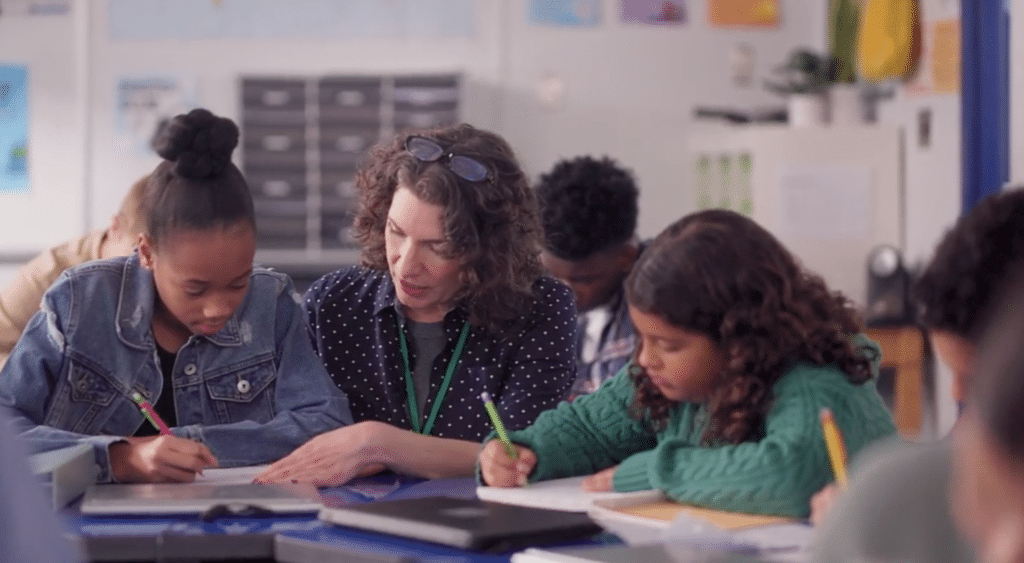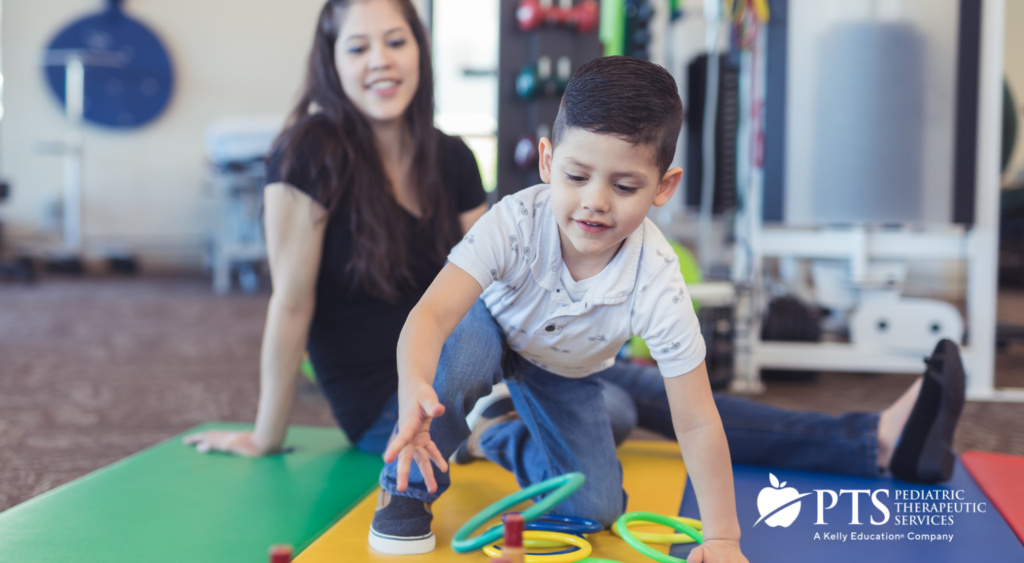What is a paraprofessional in a school?

Paraprofessionals in a school setting are dedicated professionals who provide essential support to students with special needs and Individual Education Plans (IEPs).
School districts have many names for these roles. Some of the most common are paraprofessionals, parapros, or teacher aides.
At Kelly Education, we call them paraeducators. That’s because, like paramedics or paralegals, they have specialized training in their field. Let’s explore what it means to be a paraeducator—and the important responsibilities they have in supporting students and teachers.
What do paraprofessionals do?
At a very high level, paraeducators work closely with the licensed teacher to provide students with individualized attention and support, helping to create a positive learning environment for everyone.
The actual paraeducator job description can vary depending on students’ needs and the school district. Some typical responsibilities include:
- Supporting and assisting the licensed teacher in providing instruction to students
- Working one-on-one or with small groups of students, including those with IEPs
- Helping with classroom management and behavior interventions, as established by the teacher
- Implementing necessary accommodations and modifications for students, such as reading directions out loud or acting as a scribe
- Collecting data on student progress and reporting it to the teacher
- Preparing classroom materials created by the teacher
- Helping students with assistive technology, such as speech-to-text programs or picture communication systems
- Participating in professional development and team meetings with other educators
What skills do school paraprofessionals need?
Though it’s a beneficial and rewarding position, working as a paraeducator also comes with challenges. There are specific skills and qualities that successful paraeducators often share, including:
- Patience and empathy. Working with diverse students requires patience, understanding, and compassion.
- Flexibility. Paraeducators must be able to adapt quickly to changing situations and student needs. You may go from providing one-on-one support to working with a small group or be asked to move from one learning environment to another.
- Strong communication skills. You will need to communicate effectively with students, teachers, and parents. This includes active listening, asking questions, and providing clear instructions. Good communication skills also involve giving feedback and addressing concerns professionally.
- Collaboration. Paraeducators work closely with licensed teachers and other educational professionals, such as speech and language pathologists and physical therapists. The ability to collaborate and work as part of a team is essential in ensuring the success of all students.
- Organization and time management. You’ll likely be juggling multiple responsibilities throughout the day. It’s important to stay organized, prioritize tasks, and manage your time effectively to meet the needs of all students.
- Knowledge of or willingness to learn about special education. Many paraeducators work with students who have special needs or disabilities. While a basic understanding of special education practices and techniques can be helpful, a willingness to continue learning and adapting to support each student is even more essential.
What is the usual classroom environment for paraeducators?
As a paraeducator, you’ll complete your assigned duties in various educational settings. Here are three specific classroom settings where you may work:
General education classroom.
In general education classrooms, students with and without IEPs learn together. This provides a more inclusive learning environment with peer interaction and socialization opportunities.
You’ll help implement accommodations and modifications for students with special needs to ensure their success. You may need to redirect students, help with small group instruction, assist with technology, or provide one-on-one support with specific tasks.
Resource room.
In some cases, students with disabilities or special needs may receive additional support in a resource room within the school. As a paraeducator, you may work with these students in small groups or one-on-one to provide extra support and instruction based on their individualized needs.
While reading, math, and writing are common subjects in resource rooms, you may also work on other skills, such as social-emotional learning or life skills.
Self-contained classroom.
In self-contained classrooms, all students have a disability or special need that requires more intensive support. As a paraeducator, you may be responsible for supporting a specific student or working with small groups of learners.
Your responsibilities could include accompanying students to specials in the general education setting, such as music or PE, helping students practice life skills, or assisting with behavior management strategies.
What are the benefits of working with students with special needs?
Paraprofessionals in a school work with students with special needs have a unique opportunity to impact students’ lives. Not only will you work closely with students and see their progress, but you’ll also have the chance to contribute to a more inclusive learning community.
Making a difference.
Working with students with special needs can be challenging, but it’s also rewarding. You have the chance to help students overcome obstacles and reach their full potential. In addition, the teacher shortage is real, especially in special education. By stepping in and providing support, you’re making a huge difference.
Learning new skills.
From assistive technology to behavior management techniques, you can expand your skill set and increase your knowledge of different teaching methods. These skills are valuable for your current role and easily transferable to other positions in the education field.
Having variety in your day.
You may be responsible for supporting students through various tasks and activities, such as academic instruction, behavioral support, and social interaction. This variety can make your job more interesting and keep you engaged.
Personal satisfaction.
The students you work with need your support and guidance. Seeing them progress and learn can be incredibly fulfilling.
Being in demand.
Special education jobs are in demand. As an experienced paraeducator working with students with special needs, you’ll be a valuable asset to schools nationwide, making finding a new job easier.
How to become a paraeducator.
If you think working as a paraeducator may be the right career path, here are some steps to help you get started:
- Research state and local requirements: Check with your state’s Department of Education and local school districts to understand the paraeducator requirements in your area. These vary by state and district.
- Obtain necessary training and education: Depending on your district’s requirements, you may need to complete specific courses or training programs related to special education and working with students with special needs. A paraprofessional test may also be required.
- Gain relevant experience: Many districts prefer candidates who have prior experience working with children, whether through volunteering, tutoring, coaching, or other related roles. Working as a substitute paraeducator is a great way to get some experience and test the waters in this role.
- Apply for paraeducator positions: Once you meet the requirements, start applying for positions in schools near you.
- Stay up to date on best practices: The field of special education is constantly evolving, so it’s essential to stay updated on current practices and techniques by attending workshops or conferences, joining professional organizations, or taking continuing education courses. For example, our paraeducators must complete our exclusive ParaSmarts™ Training Program to help prepare them for success.
Working with Kelly Education as a paraeducator.
At Kelly Education, we’ve carefully cultivated a program that nurtures and enhances the skills of thousands of paraprofessional educators and substitute paraeducators across the country. Our goal is to develop highly qualified and competent paraeducators who positively impact students.
Please join us to learn more about paraeducator jobs or other education jobs near me? Fill out our brief interest form and one of our recruiters will contact you. They’ll answer your questions and share more about opportunities to work with one of our school district partners.

View Related: Article Job searching
You might like
Find your next job
Discover thousands of temporary, full-time, and remote jobs for beginning and experienced job seekers.


